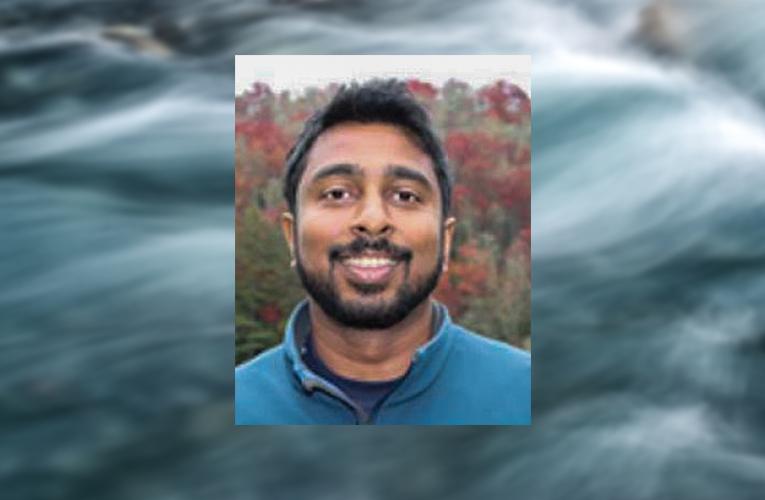This is the fourth in a series of six stories on the NSOE’s inaugural Faculty Research Symposium at the Duke Marine Lab, on September 29th.
Nishad Jayasundara, Juli Plant Grainger Assistant Professor of Global Environmental Health, studies how chemical and physical stressors affect our health. At the recent faculty symposium, Jayasundara presented “Climate Change and Pollution: Challenges, Opportunities, and the Ticking Clock for Kidneys,” discussing environmental change and kidney health.
In recent years, the precipitous rise in kidney disease in an unusual cohort, young male farmers, caught Jayasundara’s attention. Observed mostly across a swath of tropical farming communities in South America and South Asia, CKDu—chronic kidney disease of unknown etiology—indicated a warning of possible new, or sentinel, disease: in a Nicaraguan village, one in three men were diagnosed with end-stage renal failure; in a hospital in the Uddanam region of India, a new nephrology unit was set up for patients needing dialysis. A 2020 paper on CKDu by Jayasundara’s team cites disease incidence in Mesoamerica and South Asia including Sri Lanka; it’s also appearing in the U.S., in places like California, Texas and North Carolina.
Jayasundara’s team uses a multifaceted approach to its research, studying communities most vulnerable to environmental change. The most recent work focuses on Sri Lanka, where Jayasundara grew up. As a small island nation experiencing considerable environmental change in just a few decades, Sri Lanka offers valuable lessons: in certain villages, one in five people have CKDu.
For this work, Jayasundara collaborates with Mangala De Silva at the University of Ruhuna, Matara, Sri Lanka, as well as Duke Global Health, and the THEME Institute (a not-for-profit platform for policy change centered around Technology, Health, Environment, Migration, Education and Ethics, in Sri Lanka) which he co-founded to implement change at the local level. Because the disease is emerging in tropical communities, Jayasundara’s group conducted a study on heat stress, experienced by Sri Lankan farmers and fishermen alike, but their findings still did not fully explain the higher incidence of kidney disease among only the farmers.
As Jayasundara was looking to determine drinking water quality in affected communities, a new collaboration was formed at a conference in 2019 when Jayasundara talked with Lee Ferguson, associate professor of civil and environmental engineering, and expert on water-sampling methods and analysis. Jayasundara’s team began sampling hundreds of wells in Sri Lanka and made a discovery.
Glyphosate, an herbicide used throughout the world and previously thought to have components that break down over time, was banned in Sri Lanka ten years ago, but that may not have been soon enough; in Sri Lankan rice-farming communities, pervasive effects of its use may be due to the local geology.
The water analysis, led by Jake Ulrich, a PhD candidate in Ferguson’s lab, found that in certain parts of the water column, glyphosate is interacting with cations--positively charged ions such as calcium and magnesium--and therefore doesn’t quickly break down, persisting in the ground for years. Forty-four percent of the wells in the CKDu region was contaminated with glyphosate. Parallel research in the Jayasundara lab showed that glyphosate and metal-ion complexes can be toxic to the kidney, especially during human development. This work took the team back to Sri Lanka to find that children in CKDu communities also show higher levels of kidney damage.
“Now that we know at least one risk factor that increases risk of kidney diseases, what are some of the interventions we can make?” Jayasundara said. With the help of community organizers and local doctors, the work also looks to advance environmental justice. Given the impacts on children, THEME raised donations from the expatriate Sri Lankan community in North Carolina to establish water-filtration units at two schools for students 7-11 years old.
“What I enjoy the most is the opportunity we get to learn and train people on both sides,” Jayasundara said, referring to local teachers, students at Sri Lankan universities, and Duke students. “Diseases might come and go,” he said, but with multi-directional learning and training, “we can work within a community that can lead to better outcomes.”





